At the heart of Hammersmith for 400 years.
Giving older people homes for life in beautiful, affordable almshouses. Investing in the future through grant-giving. And raising the voice of our community to make it stronger.
At the heart of Hammersmith for 400 years.
Giving older people homes for life in beautiful, affordable almshouses. Investing in the future through grant-giving. And raising the voice of our community to make it stronger.
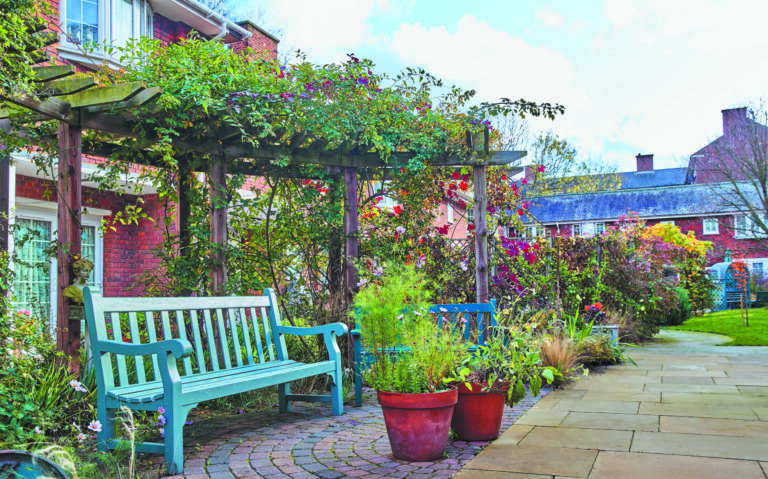
If you think you might be eligible, we'd be happy to give you a tour of our almshouses and share what it's like to live here.
Read More ...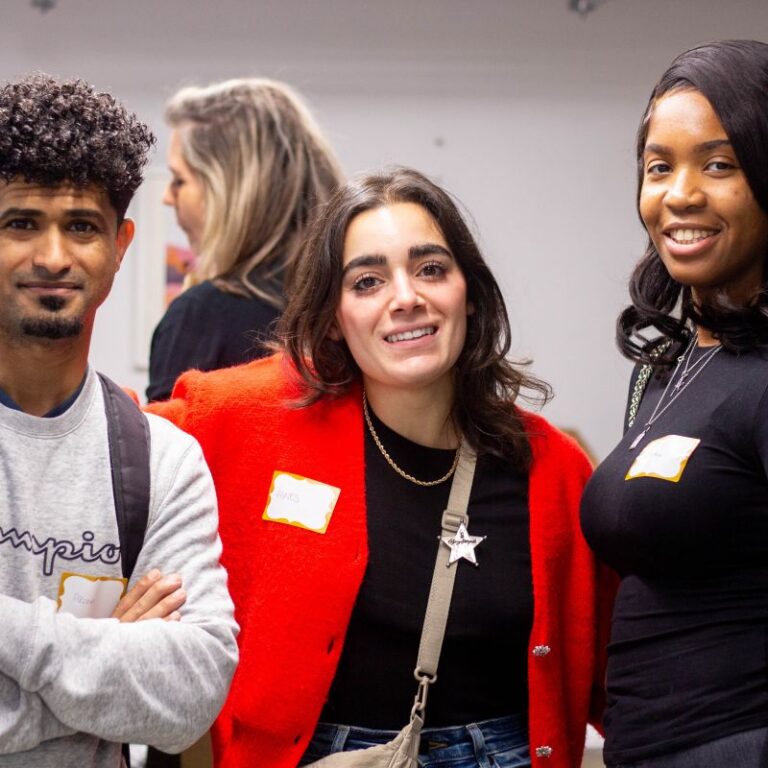
Helping parents and young people to connect with their community
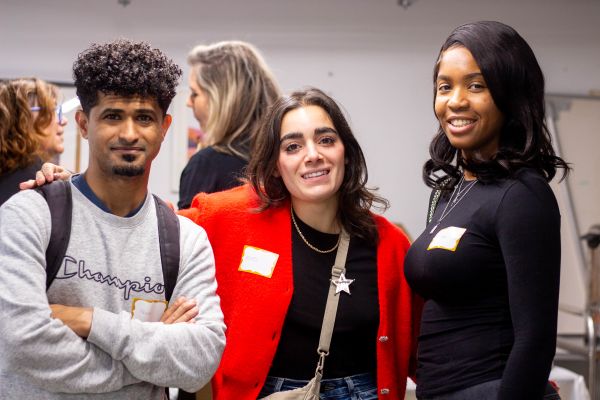
Most of us need someone to turn to at times – someone who will listen without judgement and offer advice and support. However, not everyone has that safety net. It’s all too easy to feel isolated from your peers if you’re new to the area, English isn’t your first language or you’re shy, for example.
Family Friends supports families in a number of ways, including through a games group for young people, a coffee and community group for parents, a walk and talk group for families, and a monthly SEN group. However, at the heart of the service is its befriending scheme.
Volunteers are matched with adults or young people who are struggling and need someone to talk to. As Shona Goolab from Family Friends says, “There’s nothing better than just having someone to talk to. It’s kind of like a comfort blanket, knowing that someone will consistently show up for you and help you get back on your feet.”
For parents, this might mean having another adult to talk to about money troubles or other difficulties, or someone to offer encouragement when you’re feeling overwhelmed. Kabira lives with her blind husband and three young children in a one-bedroom flat. When she was referred to Family Friends, she was struggling to meet people and wasn’t confident speaking English.
Kabira’s volunteer befriender has helped her to discover more of the opportunities available in her local area. She helped Kabira to join the local library, enrol for English lessons and take part in a singing group. They’ve been to local shops and cafes together, and Kabira has become more confident in practising her English.
Family Friends also matches volunteer ‘big buddies’ with children and young people. One such young person is 13-year-old Sara. Bullying, including physical assault, had left Sara feeling anxious and depressed. With her big buddy’s help, Sara’s confidence has increased and she’s found tools to better manage her anxiety.
Where possible, the charity matches young people with volunteers who share their interests. Shona says, “One of the young people we work with is really into music. Our volunteer has connections within the music industry so took him to a music studio. We’ve also taken him to Kew Gardens, Winter Wonderland and other places, and he’s made friends with other young people in our group. It’s been lovely to see him come out of his shell a bit; his mom says that he’s a lot more confident in school now.”
The relationship with the volunteer usually lasts six to 12 months, during which time the volunteer and Family Friends will help the family to make new connections and build their own support system. As Shona explains, “It’s about helping them to engage with their community and build their confidence so that they don’t need us anymore.”
Family Friends is one of our Flexible 3 Year Grant holders, so is receiving £15,000 a year from us for three years. Having the funding agreed in advance has enabled the charity to make plans, including organising seven two-day workshops a year to train volunteers.
If you have two hours a week to spare, you could make a real difference to a family’s life. You’ll receive full training, ongoing support and expenses. Find out more at www.familyfriendscharity.co.uk.
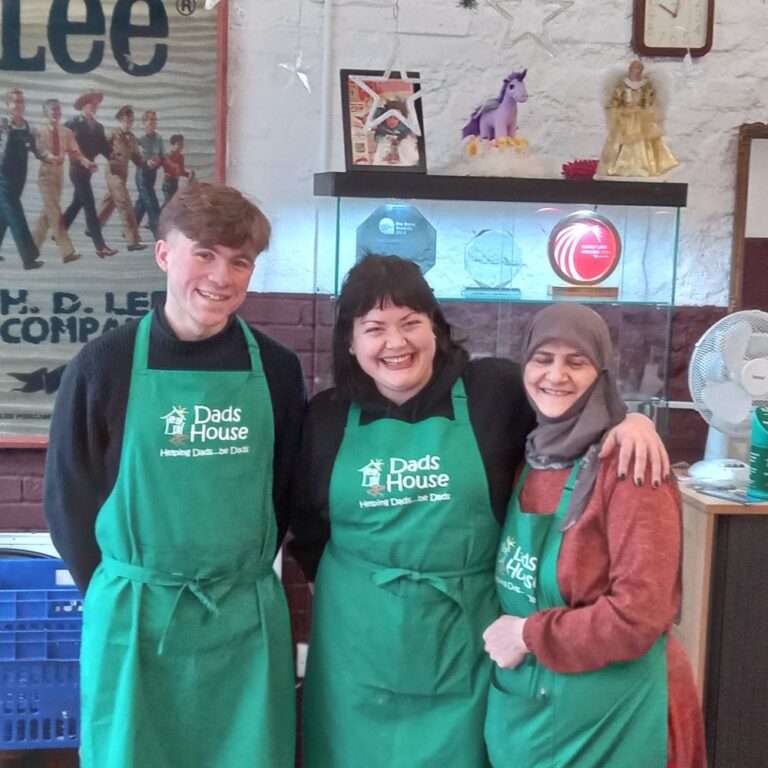
“Where there was once trauma, fear and uncertainty, we now have peace, stability, and the chance to heal.”
Back in 2008, Billy McGranaghan founded Dad’s House as a food bank for single fathers who were struggling to make ends meet. However, the charity’s remit soon expanded. Billy explains, “I set up the food bank and not one dad turned up! So, it became a community food bank overnight.”
Today, the charity aims to support people’s emotional needs as well as their financial ones, and now offers everything from a food bank, family law clinic and dads’ support group, to guitar lessons and yoga classes.
Billy was recently awarded an MBE in The King’s New Year Honours List 2026, for his work at Dad’s House. Together with a small team of paid staff and a large team of volunteers, he’s helped some 80,000 families.
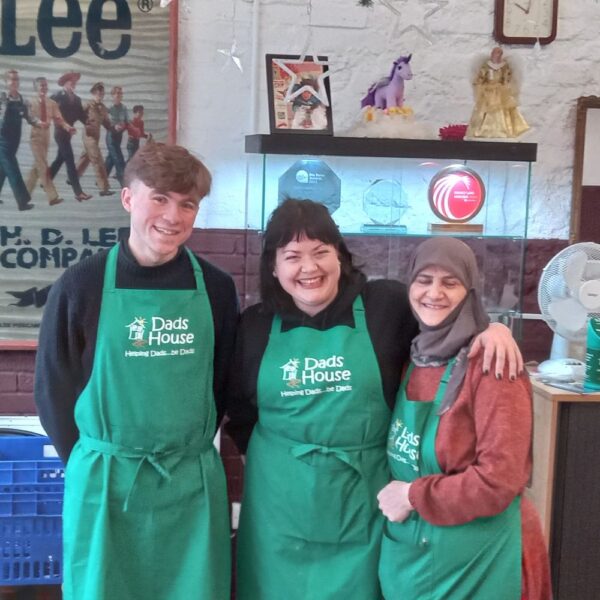 Food bank and lunch club
Food bank and lunch clubEvery week, around 160 families rely on the food they receive from Dad’s House. As Billy says, “Everybody’s broke. The cost of living is killing everybody. Food inflation is up another 3% and it’s not going to come down.”
Alongside the food bank, Dad’s House runs a weekly lunch club, where people can come together to eat nutritious food and socialise with others who understand what they’re going through. One client shared, “On Tuesdays with Dad’s House’s weekly lunch clubs, I can leave my house and know I have somewhere to talk with other people and feel part of a community.” The club is particularly needed during the school holidays, as without free school dinners children may not always have enough to eat.
A key aim of the charity is to combat loneliness and isolation. It’s often difficult for single dads to maintain friendships and meet new people. Not many jobs allow you to work in school hours only, but lower wages don’t cover childcare costs. As a result, many of the fathers the charity supports are unable to work. They’re often isolated at home for much of their spare time, as they can’t afford to meet friends for a drink, play organised sports or invite people over for lunch.
Alongside that, as Billy explains, “A lot of the dads are going through family breakdowns; it’s probably the most difficult time in that dad’s life, and the family court system is a black hole that can last up to two years.”
Dad’s Table gives struggling dads a supportive environment to talk about the difficulties they’re facing. The mutual support group meets twice a week. As one member explains, “Dad’s Table gave me a space to express my anger, my frustration, and my sadness. But it also helped me realise that I wasn’t powerless. I started to see that there were ways I could move forward, both for myself and my children.”
A pro bono family law clinic is held twice a week to support people with disputes around child arrangements. Most of the clients are either being denied contact with their children or want to put measures in place to protect them. The service receives 5,200 telephone calls and 2,500 emails per year and has directly supported more than 800 clients through the family law court.
Billy says, “Our legal director is a solicitor called Simon Bruce – one of the top financial solicitors in the country. We have a family law clinic manager, and around 10 solicitors and 50 barristers who volunteer with us. Last year, we provided £1.3 million worth of pro bono work, and that’s due to the team that we have of people who care.”
One recent client shares, “I truly appreciated Dad’s House’s unwavering focus on the children’s wellbeing. They ensured that they remained at the heart of every legal decision. Today, midway through 2025, my children and I are finally free from the court process. Where there was once trauma, fear, and uncertainty, we now have peace, stability, and the chance to heal. Looking back, I cannot overstate the impact of their work – not only in securing the right legal outcomes but also in restoring my belief in justice.”
Last year, we awarded Dad’s House £7,300 to help with energy costs and to provide essential supplies for families.
Dad’s House relies on grants and donations to run the charity. Billy shares, “A lot of our funders live locally, so they’ll pop in for a cup of tea or some lunch and see what we do on a daily basis. I’m also constantly on the phone and in meetings all over London raising money.”
Most of Dad’s House’s team are volunteers. Without volunteers, there would be no food bank, law clinic, lunch club or any of the many other services that the community rely on. If you can spare a few hours to support struggling families, visit www.dadshouse.org.uk to find out more or email info@dadshouse.org.uk.

They've each been awarded £45,000, split over three years.
2025 was a tough year for many people. Local charities have risen to the challenge, providing basic essentials, advice and other vital support. Our Flexible 3 Year Grants are designed to offer local organisations a bit more stability so they can plan for their future and, if necessary, adapt to shifts in demand.
. Our newest grant holders are:
They’ve each been awarded £45,000, which will be split over three years.
Petit Miracles helps people to lift themselves out of poverty, by giving them the skills and confidence they need to find work or succeed as an entrepreneur. The social enterprise offers furniture restoration workshops to people who have a disability or who are otherwise disadvantaged, giving them the chance to build a new career.
It also runs a business incubator programme where people can learn business skills, network and share ideas. Members are then able to sell their products in Petit Miracles’ shop in West 12 Shopping Centre.
Founder and CEO Elisicia Moore says, “All of the circa 150 people per year who benefit from our programmes experience unemployment and social exclusion and face barriers such as disability, homelessness, mental ill-health or isolation. Our programmes have been co-designed to build the skills, experience, confidence and social integration they need to gain meaningful volunteering, further training and/or paid work.”
Petit Miracles is using its grant to help launch a new coffee bike programme, Miracle Brews, which will provide training and employment for young disabled adults.
Shepherds Bush Families Project & Children’s Centre (SBFP&CC)
SBFP&CC works with families who are experiencing significant housing difficulties. Some are homeless or at risk of homelessness. Others are living in unsuitable accommodation or struggling due to low wages. CEO Tina Mayers shares, “Parents living in these situations often suffer depression and anxiety and feel guilty that they are unable to meet the needs of their children. Children and young people often miss out on the givens of normal family life. We aim to relieve the distress caused to these families and reduce the isolation and poverty most experience.”
SBFP&CC is putting its grant towards ongoing expenses and is planning to consult with parents and young people about developing new services.
You can read more about the charity in our case study.
Active Successful Engagement (ASÉ) CIC
ASÉ supports disadvantaged children and teenagers aged nine to 18, along with young adults who have SEND. Service users are experiencing a range of challenges, such as being:
ASÉ’s work includes supporting children, young people and adults via mentoring, peer support and skills-building, tackling inequality and fostering long-term wellbeing. As Director Pauline Zepherin explains, “We empower communities, amplify under-represented voices and drive systemic change. Working with families, local authorities, schools and the NHS, we deliver culturally responsive community-led solutions that build resilience and long-term impact.”
ASÉ CIC is using its Flexible 3 Year Grant to deliver i-MATTER: Advocates for Change. 36 adult Advocates for Change Champions with lived experience of disadvantage will be trained to deliver trauma-informed mentoring, advocacy work and group support to young people and families.
Find out more about applying for a grant from Hammersmith United Charities
While our Flexible 3 Year Grants focus on organisations that we already work with, we also offer Community Grants, which are open to other charities working in Hammersmith.
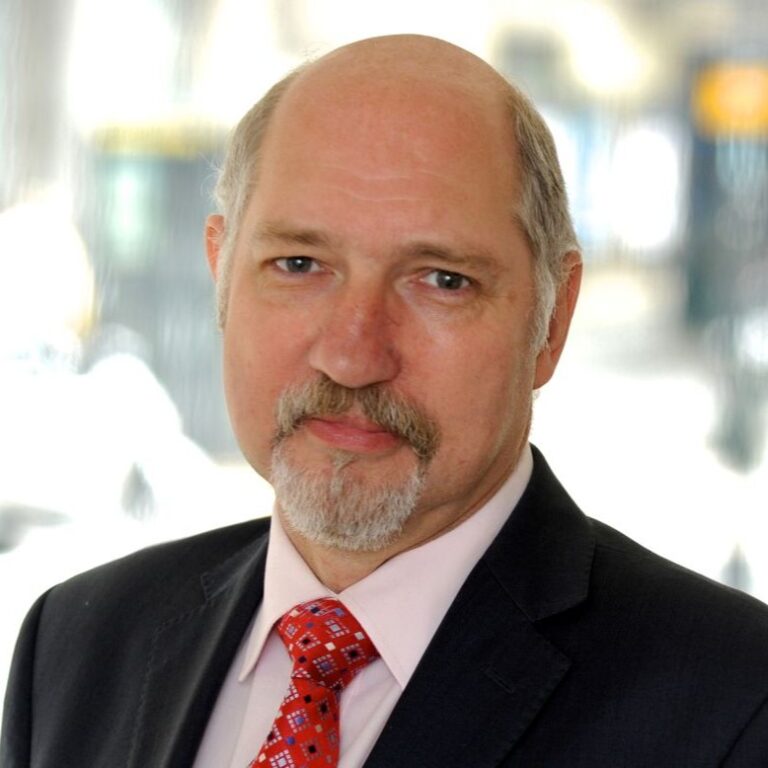
Guy Vincent shares his ambitions for Hammersmith United Charities.
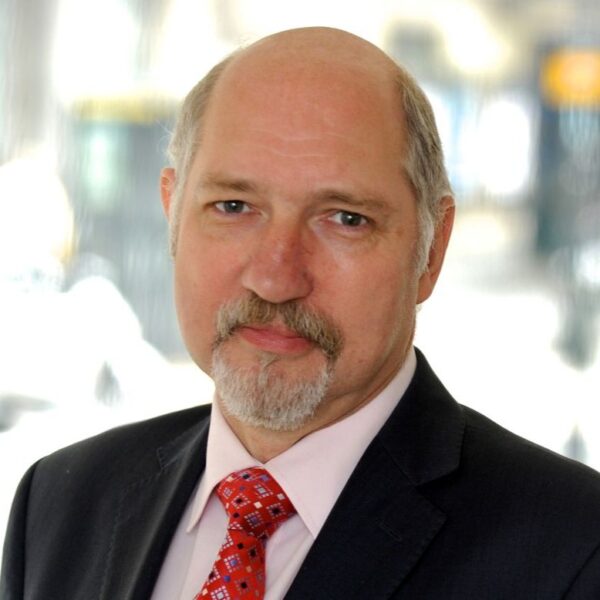 Guy is a retired solicitor who has lived in Hammersmith for over 40 years. As well as having a long legal career, Guy has decades of experience in the not-for-profit sector. He was a school governor for 35 years and spent several years volunteering as Chair of the Finance Committee at Hammersmith & Fulham Law Centre. If you recognise Guy, that’s probably because he also served as a local councillor for Hammersmith & Fulham.
Guy is a retired solicitor who has lived in Hammersmith for over 40 years. As well as having a long legal career, Guy has decades of experience in the not-for-profit sector. He was a school governor for 35 years and spent several years volunteering as Chair of the Finance Committee at Hammersmith & Fulham Law Centre. If you recognise Guy, that’s probably because he also served as a local councillor for Hammersmith & Fulham.
We spoke to Guy about why he volunteers and what he wants to achieve in his new role as Chair of Hammersmith United Charities.
I’ve been very lucky to have had an interesting career and learn skills that I’m happy to still use where I can. I’ve been engaged in the community throughout my 45+ years in Hammersmith, so I know the neighbourhood well.
I gave up my other voluntary commitments a couple of years ago as we were moving house and having a lot of work done. Once we’d finished all that, I thought it would be nice to do something in the community again. I want to contribute something, not just sit with my feet up!
I was a councillor with the previous Chair, Vivienne, and heard that she was retiring from the role. From what I’ve seen so far, Hammersmith United Charities is a great organisation and run very well, so I’m really looking forward to getting started.
It’s early days and to begin with, I’ll just be learning about the charity, understanding what can be done, and figuring out what I can contribute. I’m coming in as a stranger amongst a committee full of people who’ve been doing this for years, so I’m looking forward to getting to know people.
I’ve signed up for the Christmas dinners and plan to attend coffee mornings and things like that. People like to know who their trustees are, so I think it’s important that I’m seen around the place.
In the long term, I just want to help the charity to provide as much support to the community as it can. I’ll be working with the team – both the trustees and the management – to try to make sure that the charity prospers and continues to do great things.
It’s unlikely that we’ll be able to expand the almshouses. However, there’s a great deal of opportunity to make an impact through the grants. While the sums being given aren’t enormous, a small sum of money can have a very big impact on a small organisation.
My wife, Sarah, and I enjoy travelling by train around Europe. We’ve got more time on our hands now that we’re retired, so we can take things at a more leisurely, pleasant pace. We spend a few hours on the train, get off, stop somewhere nice, have a meander and spend the night. It’s so much nicer than flying. Italy is our favourite place to visit; we’ve been going for 40 years. We particularly love Tuscany for its lovely medieval villages, which are always a joy to visit.
We also enjoy being involved in the community. It just seems the right thing to do – work within the community, for the community.
"*" indicates required fields
This site uses cookies: Find out more.
| Cookie | Duration | Description |
|---|---|---|
| cookielawinfo-checkbox-analytics | 11 months | This cookie is set by GDPR Cookie Consent plugin. The cookie is used to store the user consent for the cookies in the category "Analytics". |
| cookielawinfo-checkbox-functional | 11 months | The cookie is set by GDPR cookie consent to record the user consent for the cookies in the category "Functional". |
| cookielawinfo-checkbox-necessary | 11 months | This cookie is set by GDPR Cookie Consent plugin. The cookies is used to store the user consent for the cookies in the category "Necessary". |
| cookielawinfo-checkbox-others | 11 months | This cookie is set by GDPR Cookie Consent plugin. The cookie is used to store the user consent for the cookies in the category "Other. |
| cookielawinfo-checkbox-performance | 11 months | This cookie is set by GDPR Cookie Consent plugin. The cookie is used to store the user consent for the cookies in the category "Performance". |
| viewed_cookie_policy | 11 months | The cookie is set by the GDPR Cookie Consent plugin and is used to store whether or not user has consented to the use of cookies. It does not store any personal data. |
| Cookie | Duration | Description |
|---|---|---|
| CONSENT | 16 years 4 months | These cookies are set via embedded youtube-videos. They register anonymous statistical data on for example how many times the video is displayed and what settings are used for playback.No sensitive data is collected unless you log in to your google account, in that case your choices are linked with your account, for example if you click “like” on a video. |
| Cookie | Duration | Description |
|---|---|---|
| IDE | 1 year 24 days | Google DoubleClick IDE cookies are used to store information about how the user uses the website to present them with relevant ads and according to the user profile. |
| test_cookie | 15 minutes | The test_cookie is set by doubleclick.net and is used to determine if the user's browser supports cookies. |
| VISITOR_INFO1_LIVE | 5 months 27 days | A cookie set by YouTube to measure bandwidth that determines whether the user gets the new or old player interface. |
| YSC | session | YSC cookie is set by Youtube and is used to track the views of embedded videos on Youtube pages. |
| yt-remote-connected-devices | never | These cookies are set via embedded youtube-videos. |
| yt-remote-device-id | never | These cookies are set via embedded youtube-videos. |
| yt.innertube::nextId | never | These cookies are set via embedded youtube-videos. |
| yt.innertube::requests | never | These cookies are set via embedded youtube-videos. |